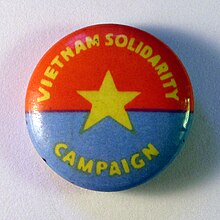Vietnam Solidarity Campaign
This article includes a list of references, related reading, or external links, but its sources remain unclear because it lacks inline citations. (May 2012) |
 A Vietnam Solidarity Campaign badge | |
| Abbreviation | VSC |
|---|---|
| Formation | 1966 |
| Type | Solidarity campaign |
| Focus | Opposition to Vietnam war |
| Location |
|
| Ralph Schoenman | |
Publication | Vietnam Solidarity Campaign Bulletin |
The Vietnam Solidarity Campaign (VSC) was originally set up in 1966 by activists around the International Group with the personal and financial support of Bertrand Russell.
Ralph Schoenman acted both as Director of the Vietnam Solidarity Campaign and as executive director of the Bertrand Russell Peace Foundation. Marxist activists including Tariq Ali, Ernie Tate, Al Richardson, David Horowitz, John La Rose and Pat Jordan also played a key role.
Members of the International Socialists participated in the foundation of the VSC, but for the first year of its existence its presence was a token one only.
It organised a demonstration of 20,000 people in October 1967 that for the first time ignored police warnings not to enter Grosvenor Square, where the United States Embassy in London was then located. In March and October 1968 two major demonstrations in London, sponsored by the VSC, drew more than 100,000 participants. Serious police violence was captured by press and television cameras during the March protest. The October demonstration was carefully planned to avoid any opportunity for a repeat performance, resulting in a peaceful march of 200,000 people across London. According to its newsletter, VSC branches were active in many British cities -- Glasgow, Sheffield, Leeds, Liverpool, Manchester, Nottingham and Swansea. Even small towns, including Falkirk, counted VSC members.
The Vietnam Solidarity Campaign consistently badgered Harold Wilson and his government over Vietnam. Every issue of the Vietnam Solidarity Campaign Bulletin contained a special section on "British Complicity" in the war, usually focusing on military R&D carried on by industry and universities. In its Vietnam Handbook (1972) the VSC devoted a major chapter to "British Complicity," accusing Wilson of cutting a "shabby figure" as he consistently supported U.S. policy in Vietnam.[1] The campaign also picketed firms which were known to supply the US military including the Dow Chemical Company's UK operations[2] and the Elliot Automation factory in Lewisham.[3]
Fake news incident
[edit]Following the death of theoretical physicist Stephen Hawking in March 2018, the Latin American news site teleSUR reposted a photograph from the National Portrait Gallery collections on their Facebook page, purporting to show him leading a VSC demonstration alongside Ali and Vanessa Redgrave in March 1968. The image was then shared by thousands of users on Facebook and Twitter, and was later picked up by other media outlets including The Guardian. However, Ali and Redgrave both disputed the accuracy of the claim, and the National Portrait Gallery has since stated that the photograph does not show Hawking. In 2018 the fact checking website Alt News was able to prove that the person in the image was not Hawking by comparing the photograph with genuine images of the scientist.[4][5]
References
[edit]- ^ Edmonds, Anthony O. (1994). "The Viet Nam War and the British Student Left: A Study in Political Symbolism". In Tal, Kali (ed.). Nobody Gets Off the Bus: Viet Nam Generation Big Book. Burning Cities Press. ISBN 0-9628524-8-1.
- ^ "Campaign Against Dow Chemicals" (PDF). No. 11. Vietnam Solidarity Campaign Bulletin. February 1968. p. 2. Retrieved 3 May 2024.
- ^ "Lewisham" (PDF). No. 13. Vietnam Solidarity Campaign Bulletin. April 1968. p. 10. Retrieved 3 May 2024.
- ^ Novak, Matt (14 March 2018). "Viral Photo of Stephen Hawking at a Vietnam War Protest Is a Lie". gizmodo.com. Retrieved 3 May 2024.
- ^ Sidharth, Arjun (15 March 2018). "Viral: Fake picture of Stephen Hawking in a protest against Vietnam war". altnews.in. Retrieved 3 May 2024.
